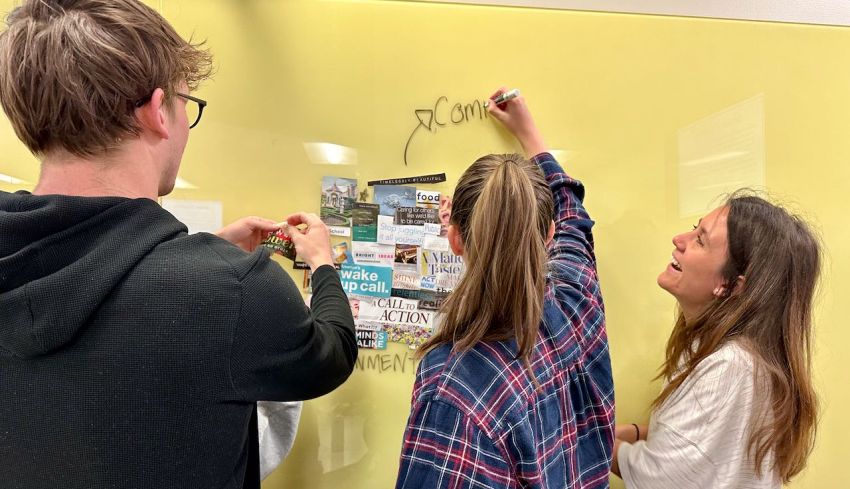Communication provides students with a strong set of practical skills that are highly valued but seldom taught. Through the curriculum, students build critical thinking skills and learn to communicate confidently and persuasively to a variety of audiences and contexts. Beyond the required courses listed here, students are encouraged to take 2000, 3000, 4000 and 5000-level courses that match their interests and career goals. Students with communication degrees find employment in diverse places such as:

- Team management
- Communication coordinator
- Client relations
- Consulting and training
For students with more specific interests, we suggest five course pathways. Based on current trends in communication, these are designed to help students find a good fit between their interests and goals. The pathways are not specific majors and the courses recommended are not exclusive. For example, if a student is interested in health communication, they may choose to take multiple courses with that specific focus. The same is true if a student is interested in civic communication or any of the other pathways. Students do not need to utilize a specific pathway, as a general communication degree can also be incredibly useful.
Again, all students are encouraged to take any 2000 and 3000 courses offered as they are applicable to all pathways.
You may read more about the courses on the Course Description page here.
COMM Career Pathways
Intercultural Communication
This path prepares students to operate in intercultural and international environments to diagnose and solve problems unique to programs that reach across cultural borders. Students learn how to appropriately and effectively perform in domestic and international cultural contexts. Courses examine the ways in which communicators may facilitate, orchestrate and manage messages across differing audiences.
Examples of career areas include:
- Community coordinator
- Resettlement manager
- Training facilitator
- Diplomacy
Recommended courses:
- COMM 4100 Communication Strategies of Social Movements
- COMM 5430 Gender, Work & Communication
- COMM 5450 Communication & Immigration
- CMJN 4400 Gender Communication
Health Communication
This path prepares students to identify and address communication challenges in the healthcare field. Students learn strategies to both inform and persuade individuals, organizations and communities to make positive health choices. Courses also examine the ways in which collective decision-making and cultural influences impact health choices.
Examples of career areas include:
- Public health
- Healthcare outreach
- Medical marketing
- Patient advocate
Recommended courses:
- COMM 3110 Persuasion
- COMM 4480 Health Promotion Message & Design
- COMM 4490 Health Media & Communication
- COMM 5470 Health Communication
Social and Interpersonal Communication
This path prepares students to manage relationships in corporate, nonprofit and personal settings to maximize opportunities. Students learn foundational skills for accomplishing personal, group and organizational goals by understanding the communication processes involved in how individuals inform, persuade, relate and interact with one another. Courses cover practical skills such as conflict management, building healthy personal and professional relationships, overcoming communication barriers, and leading groups and organizations.
Examples of career areas include:
- Team management
- Human resources
- Career advisor
- Labor relations
Recommended courses:
- COMM 3300 Communication & Conflict
- COMM 3800 Family Communication
- COMM 4800 Interpersonal Communication
- COMM 5700 Discourse in Social Life
Organizational Communication
This path in organizational communication prepares students to identify and address internal and external issues organizations encounter. Through communication theories, concepts and skills, students are prepared to address issues such as team decision-making, leadership and training, and diversity in local, national and international organizations. Students are equipped to facilitate organizational culture, socialize stakeholders and address changes in those environments.
Examples of career areas include:
- Employee relations
- Training and development
- Events coordinator
- Communication director
Recommended courses:
- COMM 3400 Organizational Communication
- COMM 4430 Communication Training and Consulting
- COMM 4410 Theories of Leadership
- COMM 5430 Gender, Work & Communication
Civic Communication
This path prepares students to solve problems currently facing communities through broader persuasive public strategies. These courses emphasize practical skills related to constructing messages, persuasion and argumentation. Students are equipped with a rhetorical dexterity and critical thinking skills that allows them to adapt to meet the advocacy needs of their communities by reasoning through issues and making and evaluating solutions.
Examples of career areas include:
- Law
- Community relations
- Politics
- Public affairs director
Recommended courses:
- COMM 4100 Communication Strategies of Social Movements
- COMM 4430 Training & Consulting
- COMM 4700 Legal Communication
- COMM 5600 Political Communication
